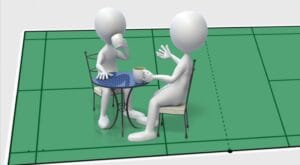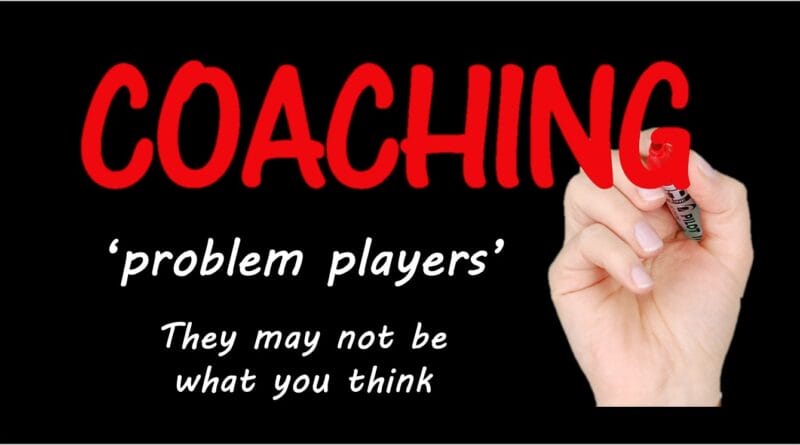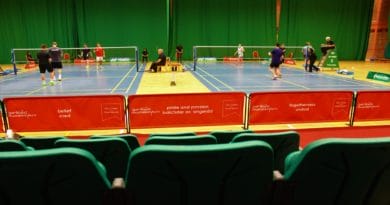The ‘problem players’ in front of you
Do you think that you have ‘problem’ players?
Please look again
They may not be what you see and believe
A friend sent me this
It described many of the players I’ve been happiest to coach
– – – – – – – – – –
Unknown author – Facebook
“That lazy player that seems de-energised and disinterested. That player may not be lazy. Perhaps they’ve never seen self-discipline, nor been taught it!
That distracted player who seems distant and disengaged. That player may not be careless, just nervous! Nervous because they do care! Nervous because they care a great deal!
That ‘uncoachable’ player who pushes back, who speaks a little plainly. That player may not be rude, just assertive. Celebrate their confidence. Embrace it, enjoy it, and go from there…
That player who never says anything. Maybe it’s not laziness nor disinterest. Maybe it’s a little shyness…a little social anxiety. This is a characteristic you can work towards helping them overcome.
That player who can tend to bully others. Maybe they’re being bullied themselves. Keep an open mind because you never know the life they’re experiencing behind closed doors.
That player who’s timid in the challenge. There’s a better description than ‘weak-minded’…it’s tender-minded. Recognise their super-power, and set about teaching them how to tackle assertively.
That player who messes about a lot. That one who wants attention on them. Maybe there’s a reason for this or maybe there’s not. Either way, they yearn for boundaries…boundaries, borders and rules.
That player who’s engulfed in anxiety. The one who looks like a nervous wreck. Don’t discard them for their butterflies. Every internal state is manageable with skills and competencies and care and attention.
That player who is really good but never practices. That really frustrating one. Perhaps they need practice sessions that capture their imagination. Or maybe they need you to keep cajoling them…maybe they need you to persist.
Every single player who’s passionate about the sport they play is served characteristics that help and hinder them
‘Served’ because that’s how we function – we experience our characteristics, we don’t do them on purpose. And these characteristics, in the main, are neither right nor wrong, they just are! They’re not our fault, they’ve evolved in us as humans because they all work to help us get along and get ahead.
Young and old alike, lots of ability or lacking ability, it’s always the same. No one chooses their characteristics until they are exposed to techniques that develop the skills and competencies they need to manage them, to flex them, to shift them.
Herein lies the opportunity for a coach – to deliberately influence the practice environment, and work with the characteristics you see.
Help players flex or adapt, to discover a world of possibilities, challenges and enjoyment
So here’s a respectful suggestion – don’t (necessarily) expect people to come into your session with characteristics that are perfectly aligned with your desired behaviours.
Try to avoid making an immediate judgement about the characteristics you see.
Look to help people build the skills to flex and shift and adapt.
That’s coaching!”
– – – – – – – – – –
When I read this it stopped me for a second. It described so many players I’ve coached. It brought back memories of challenges, frustrations, and work-around ideas, plus of course lots of smiles, success and joyful sessions.
My wish is that all coaches would take a moment and consider how to help all players, including those ‘problem players’ and work hard to inspire and motivate them. Deliberately influence the practice environment, and work with the characteristics you see.
Coaches: certainly, be knowledgeable of the game and even more so of the coaching methodologies you use. However, these skills come to a close 2nd to understanding your players
Above all else understand the desires, needs and wants of your players
– – – – – – – – – –

Thanks to the friends who sent me this.
As always, I’m very grateful if you have read this far 🙂
It would be great to hear what conversations you have with your coaching friends and to hear your experiences with ‘problem players’.
My hope is that you realised that they weren’t all ‘problems!
Why not send me an email contact@badmintonandy.com
This is part of a series of conversation starters.
Although not in detail, the posts are written to get you thinking and talking with others.




